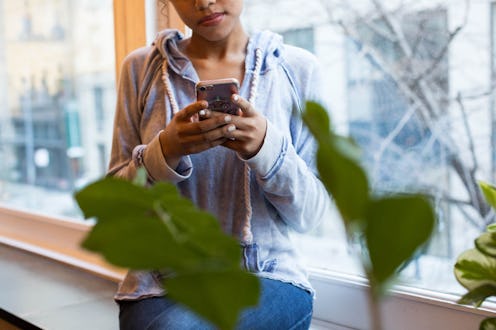Life
This Canadian Teen Is Trying To Revive A First Nations Language — With An App

In Canada, indigenous languages that were once widely spoken are now endangered. In 1996, 26 percent of Canadians spoke a First Nations language; by 2011, that number had declined sharply to 14.5 percent, according to census data. But 15-year-old Tessa Erickson, a member of the Nak'azdli Whut'en First Nation, is doing something to stop that decline: She's building an app to preserve and revive the Dakelh langauge her family spoke for generations, according to the CBC.
Erickson, who's a high school student from Prince George, British Columbia, told CBC that when she was growing up, her father would "occasionally speak to her in the Nak'azdli dialect of the Dakelh language historically spoken in central B.C., even though he wasn't fluent." She learned "small words" from him, and thought it "was really neat because I could tell my dad something and nobody would really know what it meant." But that also made her sad, because "no one knew what it meant" — even when they were surrounded by people for whom the language was part of their history and culture.
The decline in First Nations language vitality is due to the residential school system, Arif Virani, parliamentary secretary to the minister of Canadian heritage responsible for multiculturalism, explained to CBC in September 2017. Residential schools were church-run industrial schools in Canada designed to force First Nations children to adopt Eurocentric cultural ideals and practices, which included suppression of their native languages. "With the residential school system and the legacy of colonialism and racism that was perpetrated against Indigenous peoples in this country, what you had was an active government-sponsored effort to try and take culture and language and remove it from people in an effort to assimilate them into mainstream culture," he said.
Erickson told CBC that she was motivated to create the app for similar reasons. Older members of her family were prevented from speaking their band's language because of the residential school system, she said, and added, "We'd lost that part of ourselves."
Erickson plans to spend 2018 building the educational app, and will also be running a summer camp that will tie in to the app's curriculum. Her app, for which she won a $50,000 grant from her band, is in the early stages of development. When it's up and running, it will help folks start learning basic words and sentence structure. Erickson's camp will build on that base of knowledge, offering youths who are using the app the chance to "learn the language from elders and trained speakers," CBC reported.
Erickson is also planning to help the app flex and grow by obtaining coding lessons for other members of her Nak'azdli Whut'en band, so they will be able to help operate and update the app.
While she's building the app, she's continuing her own education in the language, she told CBC, working toward fluency by "speaking to elders and enrolling in a Dakelh language course in a different but similar dialect at the college of New Caledonia."
Becoming fluent is vital to her because "I feel I haven't quite lived out my full potential as a member of the band because I cannot speak the language and parts of the culture I haven't learned yet," she told CBC.
Virani told CBC in September that "with reclamation of language comes affirmation of Indigenous identity, as well as a sense of belonging, of solidarity and of community that has a ripple effect on education outcomes, career prospects and lowering the number of Indigenous people in the criminal justice system."
Erickson expressed similar sentiments. "Bringing back the language could really help us as a community come together culturally," she said. She told CBC she's especially hopeful that other youths will join her, learn from the app, and help carry their language and culture forward.
"We are the future," she said. "It's up to us."